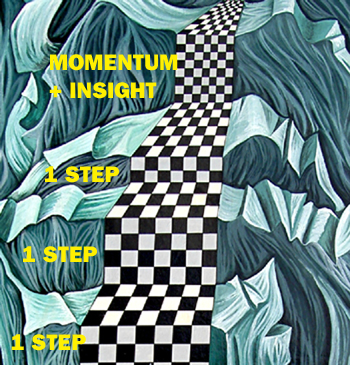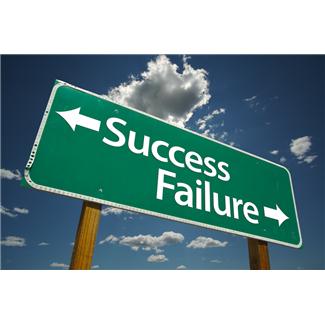Fortifying The Mind At An Early Age: The Power Of 1-Step Education: 1 Layer, Then Another, Then Another
FORTIFYING THE MIND FROM AN EARLY AGE: THE POWER OF 1-STEP EDUCATION: 1 LAYER, THEN ANOTHER, THEN ANOTHER (ISSUE 47)
By Diane Gold
 Ever think about how taking 1 step, such as developing a friendship, succeeding at doing an experiment, getting an award, creates the next step in the same direction as the first step? Each step taken creates a layer of proficiency and understanding that grows every time a new step is taken. And the momentum from the first step continues, if we put in a tiny bit of effort. This is 1-Step Education.
Ever think about how taking 1 step, such as developing a friendship, succeeding at doing an experiment, getting an award, creates the next step in the same direction as the first step? Each step taken creates a layer of proficiency and understanding that grows every time a new step is taken. And the momentum from the first step continues, if we put in a tiny bit of effort. This is 1-Step Education.
What happens when we finish a report, understand a math process, get an A in school or pass our veterinary boards? We run around excited that we have accomplished an important task. We gain immediate confidence. We actualize the new level of focus we have attained in order to accomplish the task in the first place. We instantly put ourselves in a better position to learn more deeply and vigorously because we have more power from the first success.
REACTIONS TO SUCCESS
I remember making sales calls. Since I know scientifically that the mindset following success put me in a good position to repeat the process, I decided to check my physical changes when I immediately made a sale at the beginning of my sales call day. I felt
 tranquility, motivation, determination, excitation and filled with grateful laughter as I felt my presentation strengthen itself. I also noticed how my confidence level remained throughout the entire session and past it. I was high-fiving myself repeatedly and had more sales than usual because of the initial reactions from the early-in-the-session success.
tranquility, motivation, determination, excitation and filled with grateful laughter as I felt my presentation strengthen itself. I also noticed how my confidence level remained throughout the entire session and past it. I was high-fiving myself repeatedly and had more sales than usual because of the initial reactions from the early-in-the-session success.
REACTIONS TO FAILURE
I also noticed that, on days when I didn’t make any sales, I thought of the Q word (Quitting working because I didn’t have it), the F word (getting Fired due to poor performance), the I word (being Inadequate at sales), the S words (becoming a better Student of the sales process and Studying more technique).
When we fail a test at school,
1) We might think of it as a disaster, something that is life-changing. This might cause us to binge eat because our level of self-love is way down. Or pout or lose confidence for our next test. Certainly, it would create that sinking feeling that comes when we get bad news.
2) We might pretend we don’t care about the test, especially if it’s happened before or if we don’t have family presence when we get home. This could begin a 1-step process in a negative direction where we don’t bother studying because we believe we will fail again. And, with nobody home after school, nobody must care, or so it feels.
3) We might take it in stride but decide to accelerate our studies. This could begin a 1-step process in a positive direction where we bother to study because we believe we know we can succeed.
 WHAT IF WE HAD EARLY CHILDHOOD LESSONS IN SUCCESS & FAILURE? WHICH WAY WOULD WE CHOOSE?
WHAT IF WE HAD EARLY CHILDHOOD LESSONS IN SUCCESS & FAILURE? WHICH WAY WOULD WE CHOOSE?
Since reaction to success and failure is so important to look at, shouldn’t we learn about what researchers have discovered about human reactions, human behaviors and success and failure? Shouldn’t we talk about these realities in our youth so that, by the time we are high schoolers or adults, we will be so familiar with handling outcomes because we can assimilate the lessons that came 1 lesson at a time into big strength, momentum and insight?
 Lessons in how we react to success and failure, including what to do with our strong emotions, should start early on, when we are starting to develop. They should be a requirement: regularly scheduled lessons in making good choices. After all, one lesson in how we handle success and failure could change the direction of someone’s entire life, and it could be incorporated into the values or civil duties classes that already exist.
Lessons in how we react to success and failure, including what to do with our strong emotions, should start early on, when we are starting to develop. They should be a requirement: regularly scheduled lessons in making good choices. After all, one lesson in how we handle success and failure could change the direction of someone’s entire life, and it could be incorporated into the values or civil duties classes that already exist.
We could watch how successive lessons at age 5, then age 6, then age 7 and onward made more focused, more competent, less apathetic kids. We could watch how
1 step + 1 step + 1 step equaled momentum, insight and positivity.
Imagine how informed we would be with positive ammunition if we began these 1 steps at an early age! We might even insure higher graduation rates as kids improved their ability to deal with both success and failure.
After all, when we fail at something, this means we are one “yes,” one victory, one act away from success, right? Life lessons in school could be the internal fortress needed to drive us to self-motivation and studying rather than succumbing to denial, boredom and forgetting the importance of an education.
ACTION STEPS
1) Crossing The Line
a. Get a piece of chalk and walk outside.
b. Draw a 3’ straight line on the ground.
c. Stand on one side of it with both feet.
d. Step over it with both feet.
e. Congratulations, you have just succeeded at the task, so please feel good.
2) Next Time Failures Shows Up
a. Notice your emotions.
b. Notice your actions.
c. Consider what you could have done that would have been better.
3) Next Time Success Shows Up
a. Notice your emotions.
b. Notice your actions.
c. Consider what you could have done that would have been better, if anything.
d. Incorporate anything you might have done that was a better choice.
e. Congratulate yourself.
4) Employ Success Techniques When Failure Shows Up
5) Notice How 1-Step Education Already Works in Another Area Of Your Schooling.
a. Pick a subject you already take.
b. Notice how it feels as you get to know it.
c. Write about it.
d. Share what you wrote.
e. Congrats for going through the process.
 CONCLUSION
CONCLUSION
With so many parents not at home when kids get home from school, due to work schedules or other unfortunate circumstances, single step lessons in success and failure in school could be the anchor that builds up our next generation, 1 step at a time. 1 lesson today, then another in a week or 2, then another in a week or 2 starts to build up the student to make good decisions.
The 1-step education process can be seen when we study something regularly on a continual basis. The longer we stay with it, the more the material becomes part of us.
Because we learn by putting layers of knowledge into ourselves, this type of lesson can be extremely beneficial. It is the preventive education method. Rather than waiting for the student to fail, why not educate before this happens. It’s not that students won’t fail after these lessons. It’s that they will look at failure with different eyes and hopefully see it as opportunity. That seems to be the lesson.
WarriorsofWeight Consulting
 Click the image above for a helping hand.
Click the image above for a helping hand.
If you need a hand, please don’t hesitate to reach out to
FEEDBACK
Please leave a comment and LIKE this article.
DIANE GOLD, AUTHOR
Diane Gold, Founder of Warriors of Weight, Moms For Healthy Daughters, is a mentor in tai chi, kung fu and meditation, a music, fitness and stress expert and a dedicated mom.
She believes that 1-step + 1-step +1-step of true education build an exponentially strong person with a dedication to discipline. Diane says,
“Every lesson we have ever learned is with us, somewhere. When we keep studying a particular subject, over and over again, we build familiar responses of understanding. We even get to a point where we know the subject so well we can form our own conclusions. It usually gives us a sense of security.”
For help, check out Simple Secret Method Consulting.








[…] Fortifying The Mind From An Early Age: The Power Of 1-Step Education: 1 Layer, Then Another, Then An… […]